Archives: News and Updates
news-and-updates
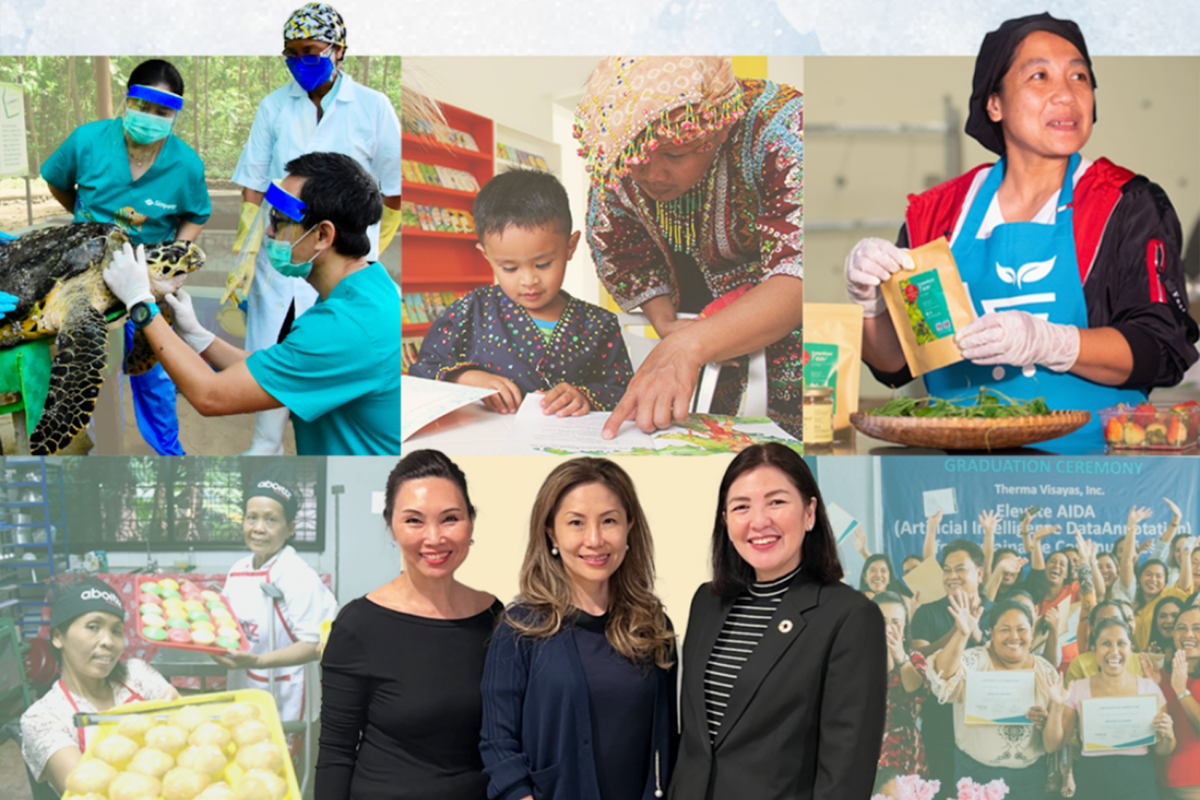
Global Investment Firm Onboards Aboitiz Foundation To Philanthropy Asia Alliance
AboitizEyesTemasek Trust, a leading player in the global investment arena, is proud to onboard Aboitiz Group’s corporate social responsibility arm Aboitiz Foundation as one of the founding members of the Philanthropy Asia Alliance (PAA) dedicated to catalyzing positive change in Southeast Asia.
Aboitiz Equity Ventures’ Chief Reputation and Sustainability Officer Ginggay Hontiveros-Malvar recently met with PAA executives Chief Executive Officer Seok Hui Lim and Director Sylvia Lim, discussed the induction and opportunities for collaboration with the aim of amplifying programs that can deliver substantial social impact. During this meeting, both parties expressed their shared commitment to driving positive change in the communities they serve. This strategic partnership marks a pivotal moment in their joint mission to empower and uplift communities across Southeast Asia and they are excited about the meaningful initiatives that will emerge from this collaboration.
“We are thrilled to embark on this remarkable journey alongside Temasek and our fellow PAA colleagues,” said Aboitiz Group President and CEO and Chairman of Aboitiz Foundation Sabin Aboitiz. “Our shared commitment to sustainable development and social impact aligns perfectly with our core values. This partnership signifies our dedication to creating lasting change in Southeast Asia.”
On September 15, PAA initiated a summit in Singapore focusing on calls to action that have been carefully curated with key partners. The goal is to mobilize support to address societal challenges and achieve common good. These calls to action are grounded in three key mandates: Climate & Nature, Holistic & Inclusive Education, and Global & Public Health. These will guide the alliance’s efforts towards driving meaningful impact and building climate change resilience across the countries within Southeast Asia where Temasek Trust operates.
PAA is poised to leverage its resources and expertise by collaborating with the Aboitiz Foundation as well as other members, private individuals, and various foundations across Southeast Asia. This collaboration is aligned with its shared vision of Empowering the Future Generation of Leaders.
Aboitiz Foundation marks 35 years of transformative impact this September 28. After three decades dedicated to sustainable community building, the foundation focuses on three flagship programs – Future Leaders, Enterprise and Jobs Creation, and Climate Action. Future Leaders is about empowering a future generation of problem-solving leaders and entrepreneurs vital for addressing pressing challenges in the Philippines. Enterprise and Jobs aims to bridge the digital divide for MSMEs and Women, fostering wealth creation, upskilling, and employment opportunities, while Climate Action focuses on creating climate-resilient ecosystems through carbon projects and waste management, climate adaptation & mitigation, biodiversity oversight, and habitat conservation.
Aboitiz Foundation being inducted into the Philanthropy Asia Alliance represents a significant step towards a brighter and more sustainable future for the Philippines and across Southeast Asia. Together, they will work tirelessly to empower communities, nurture future leaders, and combat climate change across the region.
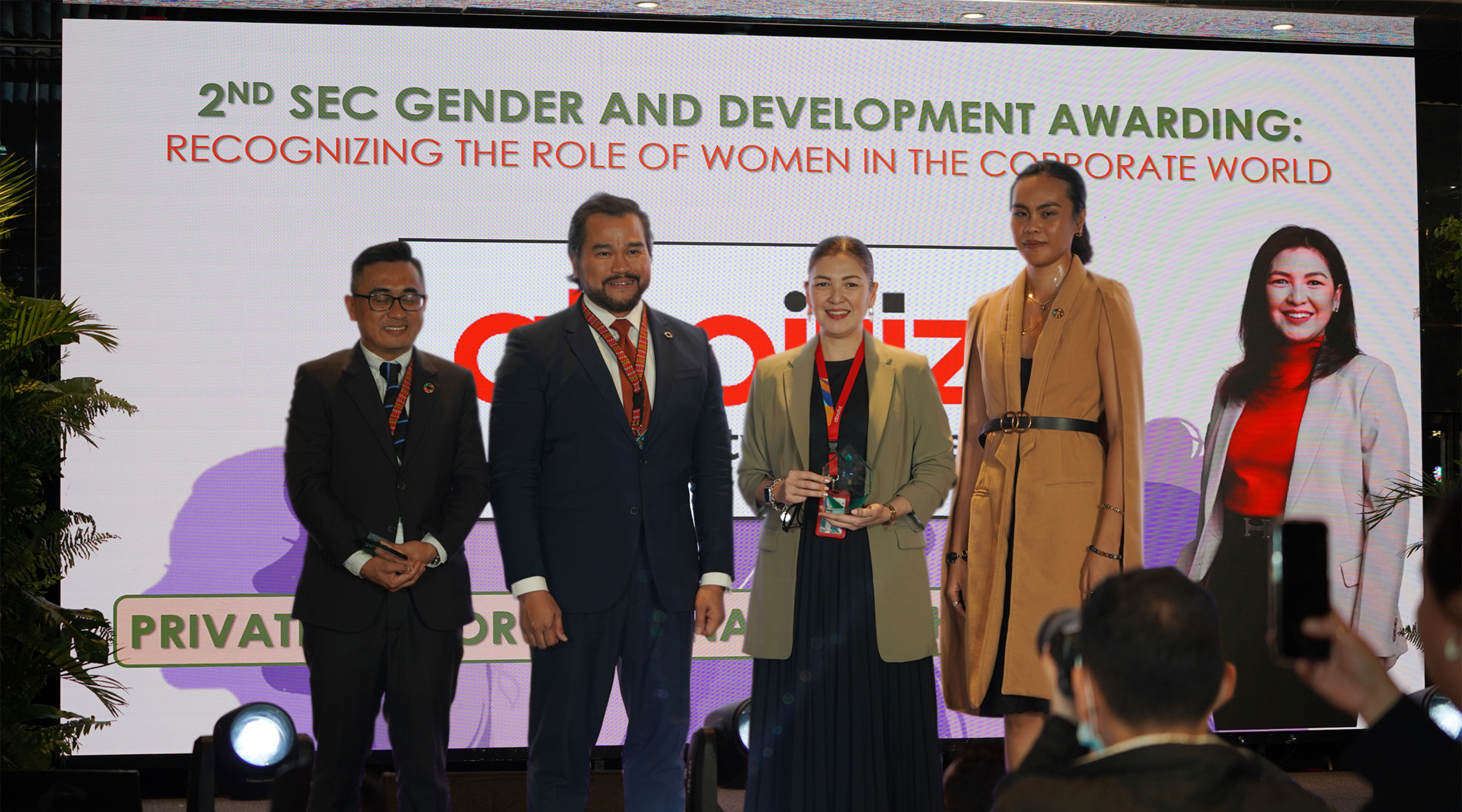
Aboitiz Group’s Sustainability Efforts Earn Public Recognition
Aboitiz EyesUnderscoring her pivotal role in driving sustainable practices within the private sector, Aboitiz Group’s First Vice President and Chief Reputation and Sustainability Officer Ginggay Hontiveros-Malvar was awarded the Private Sector Sustainability Champion at the 2nd Securities and Exchange Commission (SEC) Gender and Development Awards last Friday, November 24, 2023.
Hontiveros-Malvar highlighted the Aboitiz Group’s efforts in integrating sustainability across its portfolio of businesses, from power, banking, infrastructure, and other business units.
“Sustainability is how we do business,” said Hontiveros-Malvar. “In our journey to become the Philippines’ first techglomerate, our ambition is guided by our purpose to do good and to do it well. Sustainability is considered in every decision we make to ensure that the future we shape enables the growth and prosperity of our communities and our country,” she added.
The award also acknowledges the comprehensive sustainability initiatives led by the Aboitiz Group. These initiatives encompass the continuous investment in the progress and well-being of communities, the expansion of the group’s renewable energy portfolio, its conscientious efforts to reduce its environmental footprint, and the formulation of sustainable solutions facilitating the transition towards lower carbon business operations.
She also thanked her team for their unwavering commitment and continuous efforts in advancing the Group’s sustainability initiatives.
“The honor is shared with all our Aboitiz Group Sustainability Teams whose passion and commitment continue to drive greater value for all our stakeholders,” she said. “At the end of the day, people are at the heart of everything we do, and real impact, real sustainability only happens if we choose to put people first.”
The SEC’s Gender and Development Awards highlight women leaders in the private sector who champion gender equality and sustainable progress. As one of the Philippines’ biggest conglomerates, the Aboitiz Group’s sustainability efforts led by the Aboitiz Group Sustainability Council has set an example for private sector commitment and action.
The Aboitiz Group places utmost importance on championing sustainability initiatives through innovation, sustainable strategies, and community empowerment. Sustainability has become an integral part of the Aboitiz Group’s identity as evidenced by its diverse ESG initiatives that underscore the group’s dedication to creating positive impact for both society and the environment.
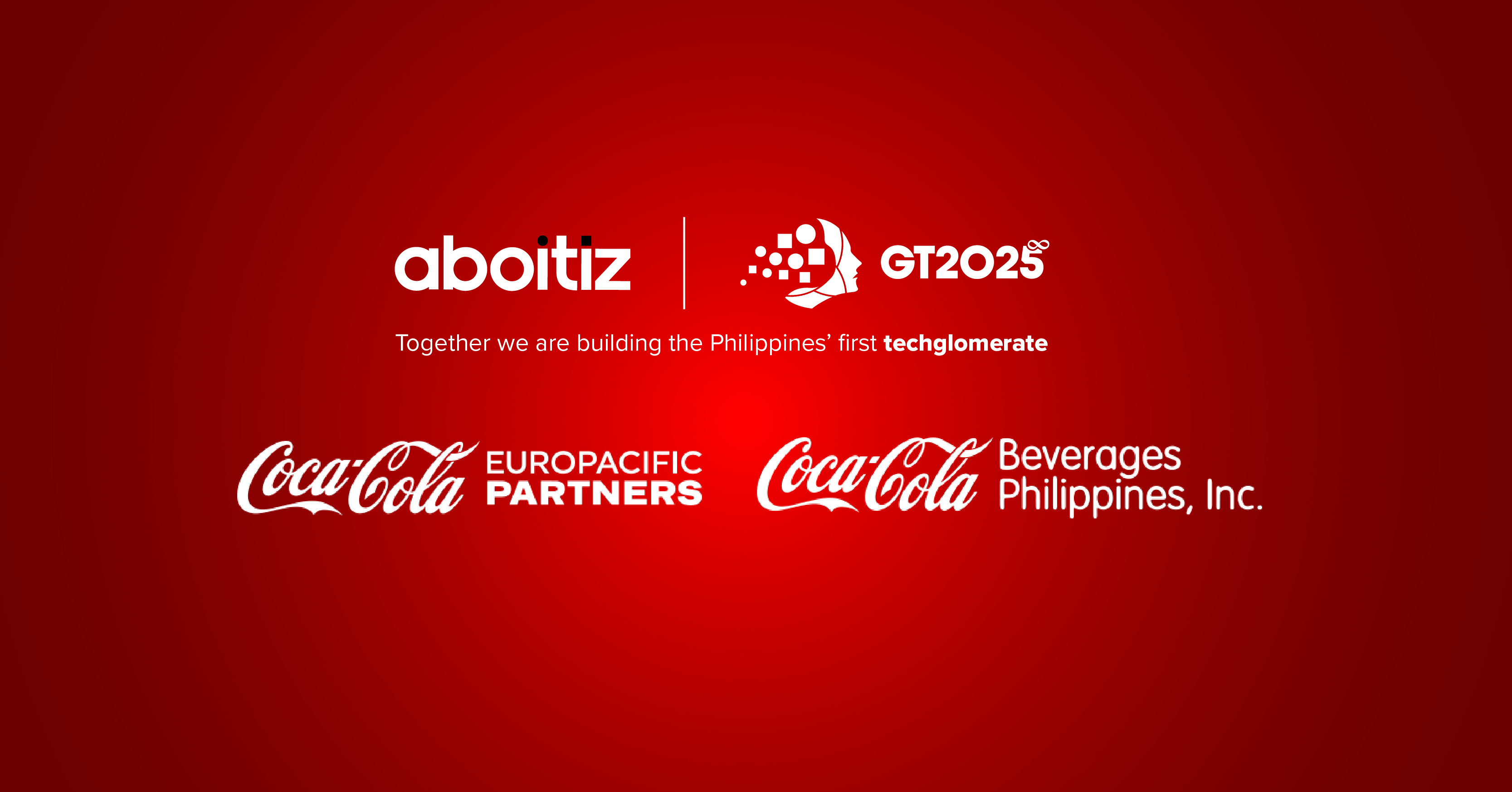
AEV, CCEP ANNOUNCE DEFINITIVE AGREEMENT TO JOINTLY ACQUIRE CCBPI, FROM TCCC
AboitizEyesFurther to the announcement on 02 August 2023, Aboitiz Equity Ventures Inc. (AEV) today announces it has, together with Coca-Cola Europacific Partners Plc (CCEP), entered into a definitive agreement to jointly acquire Coca-Cola Beverages Philippines, Inc. (CCBPI), from The Coca-Cola Company (TCCC). CCBPI is the exclusive bottler and distributor of the products of The Coca-Cola Company in the Philippines and benefits from attractive profitability and growth prospects.
Key terms of the proposed acquisition:
- 60:40 ownership structure between CCEP and AEV
- Values 100% of CCBPI at US$1.8 billion on a debt-free, cash-free basis
- Final cash consideration will be subject to cash, debt-like items and working capital adjustments at completion of the transaction
- Shareholders’ agreement between CCEP and AEV with comprehensive governance terms will take effect at
The transaction is subject to a number of customary closing conditions, including clearance from the Philippine Competition Commission.
The proposed acquisition would build on AEV’s portfolio diversification strategy to enter the branded consumer goods space. AEV is well positioned to support CCBPI’s growth ambition due to the synergies which could be generated from AEV’s other business interests in the country. The proposed acquisition would also build on CCEP’s successful expansion into Australia, Pacific & Indonesia (API) in 2021.
Further updates will be provided in due course. The transaction is currently expected to close in Q1 of 2024.
About AEV
AEV is one of the leading conglomerates in the Philippines with over 100 years of business history. It has major investments in power, banking and financial services, food, infrastructure, land, and data science and artificial intelligence. AEV is recognized as one of the best-managed companies in the Philippines and the region, consistently cited for its commitment to good corporate governance and sustainability. Currently, the company is on its Great Transformation journey to become the Philippines’ first Techglomerate as it continues to shape the future by advancing business and communities.
AEV is a member of the United Nations Global Compact, Global Compact Network Philippines Board of Trustees, the APEC Business Advisory Council and the Council for Inclusive Capitalism, and helps champion sustainability initiatives on a regional level through policies, advocacies, and initiatives that contribute to the United Nations Sustainable Development Goals (UN SDGs). With a clear focus on ESG, the company is implementing its #OneAboitizSustainability Synergy model which transforms its life-essential businesses to improve sustainable practices and continue to create a positive impact on society and the environment.
Link to AEV’s website and release: https://aboitiz.com/investor-relations/disclosure/
About CCEP
CCEP is one of the leading consumer goods companies in the world. It makes, moves and sells some of the world’s most loved brands – serving 600 million consumers and helping 2 million customers across 30 countries grow their business. It combines the strength and scale of a large, multinational business with an expert, local knowledge of the customers it serves and communities it supports.
CCEP is currently listed on Euronext Amsterdam, the NASDAQ Global Select Market, London Stock Exchange and on the Spanish Stock Exchanges, trading under the symbol CCEP. For more information about CCEP, please visit www.cocacolaep.com & follow CCEP on Twitter at @CocaColaEP.
Advisers
Nomura is acting as the sole financial adviser to AEV. Skadden, Arps, Slate, Meagher & Flom LLP and Sycip Salazar Hernandez & Gatmaitan are acting as legal counsel to AEV.
Inquiries
Corporate Secretary : connie.chu@aboitiz.com
Investor Relations : jacqui.dejesus@aboitiz.com
Media : ana.margarita.hontiveros@aboitiz.com
DISCLAIMER:
This disclosure may contain forward-looking statements that are, by their nature, subject to significant risks and uncertainties. Some of these forward-looking statements can be identified by the use of forward-looking words, including, without limitation, “outlook,” “believes,” “expects,” “potential,” “continues,” “may,” “will,” “should,” “could,” “seeks,” “predicts,” “intends,” “trends,” “plans,” “estimates,” “anticipates” or the negative version of these words or other equivalent or comparable words.
All forward-looking statements are based upon estimates and forecasts and reflect the views, assumptions, expectations, and opinions of the management of AEV, which are all subject to change due to various factors including, without limitation, changes in general economic conditions. Any such estimates, assumptions, expectations, forecasts, views or opinions, whether or not identified in this communication, should be regarded as indicative, preliminary and for illustrative purposes only and should not be relied upon as being necessarily indicative of future results. The forward-looking statements and any projections or other forward looking financial or market information contained in this communication are subject to a number of factors, risks and uncertainties. Potential risks and uncertainties that could cause the actual results to differ materially from those expressed or implied by forward-looking statements include, without limitation, changes in business, market, financial, political and legal conditions; changes to the timing and proposed structure of the proposed transaction; failure to agree and execute definitive agreements; failure to realize the anticipated benefits of the proposed transaction; and the ability of the parties to the proposed transaction to satisfy the conditions to closing the proposed transaction, including as a result of the risk that any regulatory approvals are not obtained, are delayed or are subject to unanticipated conditions. The foregoing list of factors is not exhaustive. In addition, there may be additional risks that AEV does not presently know, or that AEV currently believes are immaterial, that could also cause actual results to differ from those contained in the forward-looking statements.
There can be no assurance that forward-looking statements will prove to be accurate, as actual results and future events could differ materially from those anticipated in such statements.
Forward-looking statements speak only as of the date they are made. AEV specifically disclaims any obligation to update forward-looking statements, except as required by law. Accordingly, there should be no undue reliance placed upon the forward-looking statements.
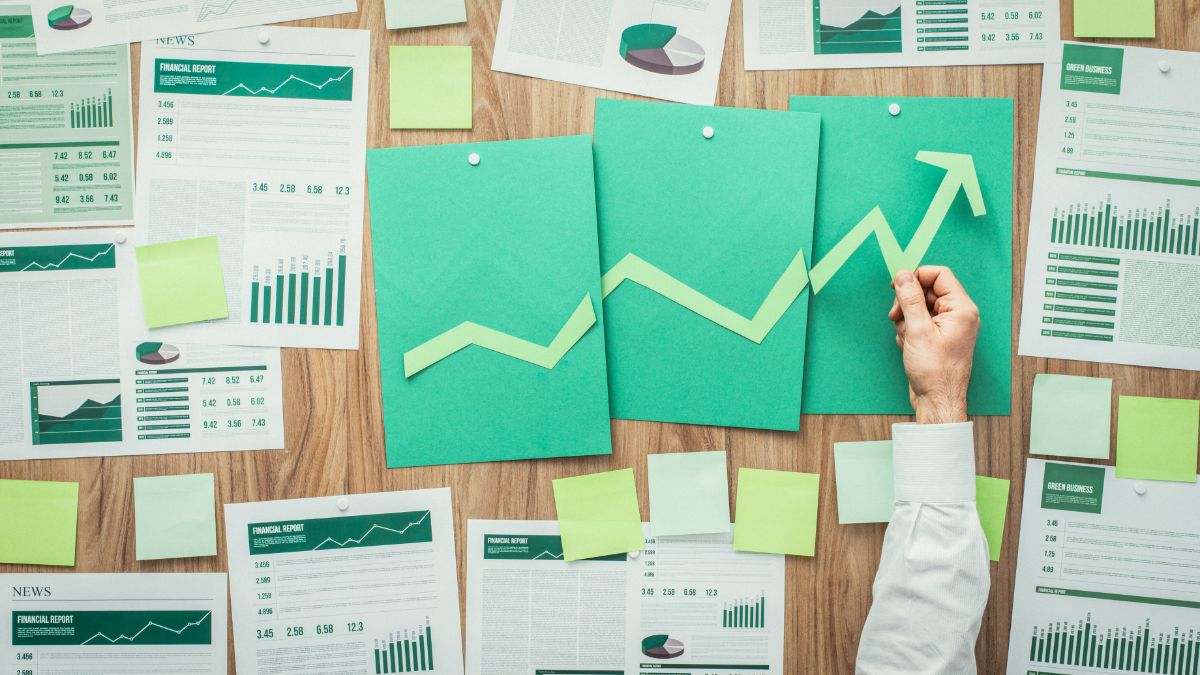
5 CSR Practices that Shape the Banking Sector
AboitizEyesWhat are some CSR practices in the banking sector?
- Funding clean energy and eco-friendly projects
- Ensuring transparency and ethical governance
- Advancing financial inclusion
- Engaging in philanthropy and volunteerism
Overview
- Financial institutions play a crucial role in shaping the future of the planet and society.
- Independent banks and credit unions are adopting Corporate Social Responsibility (CSR) practices for positive change.
- Financial institutions are embracing CSR by investing in clean energy, promoting transparency and ethical governance, expanding financial inclusion, and actively participating in philanthropy and volunteerism.
- Aboitiz’s focus is on responsible banking through environmental conservation, equality promotion, and trust-building.
Over the past five years since the signing of the Paris Climate Accord in 2015, the world’s 60 largest banks invested a staggering $3.8 trillion in fossil fuel projects. This investment exposes an uncomfortable truth that some traditional banks channel their money into causes that lack positive environmental or social impacts.
Believe it or not, financial institutions significantly affect the future of our planet and society. Though these firms are usually associated with profit, independent banks and credit unions are now evolving to drive a force for positive change by adopting Corporate Social Responsibility or CSR practices in banking in the Philippines.
In this article, we will highlight how responsible finance intersects with addressing environmental concerns, ethical governance, financial inclusion, and philanthropy. And how we can help shape a better, sustainable future through the financial choices we make.
What is Corporate Social Responsibility in the Banking Industry?
Corporate Social Responsibility within the banking sector embodies a firm’s dedication to operating in a socially responsible and ethical manner. This commitment is rooted in the delicate balance of achieving financial objectives while concurrently fostering societal benefits.
Here are the four CSR practices in banking financial institutions can do today:
Funding Clean Energy and Eco-friendly Projects
The urgency of addressing climate change and environmental degradation has never been greater. Financial organizations are increasingly understanding the need to invest in sustainable energy and environmentally friendly projects.
They not only help the shift to a cleaner future by investing in renewable energy sources such as wind, solar, and hydropower, but they also open up new potential for sustainable growth.
In recent years, green finance, financial activities that support environmental sustainability efforts, have gained traction. These initiatives include green bonds and sustainable investment funds or the green bond market that is said to boost $2.36 trillion by 2023.
These instruments direct funding towards projects that have a good environmental impact. Financing the installation of solar farms, for example, or boosting energy efficiency in buildings helps to reduce greenhouse gas emissions and mitigate climate change.
Ensuring Transparency and Ethical Governance

Transparency and ethical governance are essential components of responsible CSR practices in banking. Financial institutions place a high regard for honesty, accountability, and public disclosure of operational and governance information.
For instance, UnionBank emphasizes the need for openness and ethical governance. These principles serve as the foundation for its operations. “Teching Up,” UnionBank’s ESG objective, focuses on environmental conservation, equality promotion, and trust-building. It drives digital banking transformation through partnerships, provides intensive training, and invests proactively in technology to improve financial inclusion for Filipinos.
This Aboitiz-led bank assesses its influence on sustainable practices and inclusive financial developments, with an emphasis on job creation, community empowerment, and rural development. Their most recent effort, “Tech Up Pilipinas,” intends to lift the Philippines to G20 status by 2050 by tackling broader financial concerns, lowering carbon footprints, and improving stakeholder well-being.
Advancing Financial Inclusion
Financial inclusion, or the notion that everyone should have access to inexpensive and dependable financial services, is an essential component of responsible banking. Many remain unbanked or underbanked in the Philippines.
Banko Sentral ng Pilipinas confirmed in their 2019 report that 71% of the total adult population are unbanked Filipinos due to a lack of financial income. This scenario restricts economic possibilities and financial security.
By delivering innovative and accessible banking products, financial firms may play a significant role in expanding financial inclusions. Mobile banking, microfinance, and community-based financial services are just some of these.
Engaging in Philanthropy and Volunteerism

As the premier techglomerate in the Philippines, Aboitiz’s services transcend from power to banking. The company is greatly involved with various philanthropy and volunteerism work in the country as they understand that their role in society goes beyond profit-making.
Philanthropy, as exemplified by organizations such as Ramon Aboitiz Foundation, Inc. (RAFI) and the Aboitiz Foundation, efficiently addresses major social concerns such as education, healthcare, and poverty reduction. At the same time the business’s commitment to volunteerism, as evidenced by projects such as Biyahe Digiskarte, encourages employees to participate in community service, empowering communities and closing the digital divide.
Key Takeaway
Profit is no longer the main goal in today’s financial landscape. It has progressed into a powerful force for meaningful change. Financial institutions are tying the threads of responsible finance together. The way forward is clear: it’s creating a more sustainable, inclusive, and compassionate future.
Aboitiz Group takes the lead in this responsible finance cause by resolute adherence to the various principles we discussed here. This not only strengthens their position as the leader of corporate social responsibility reporting in the Philippines but also makes significant contributions to creating a sustainable future for the country.
Contact our team today if you want to know more about our CSR in banking initiatives.
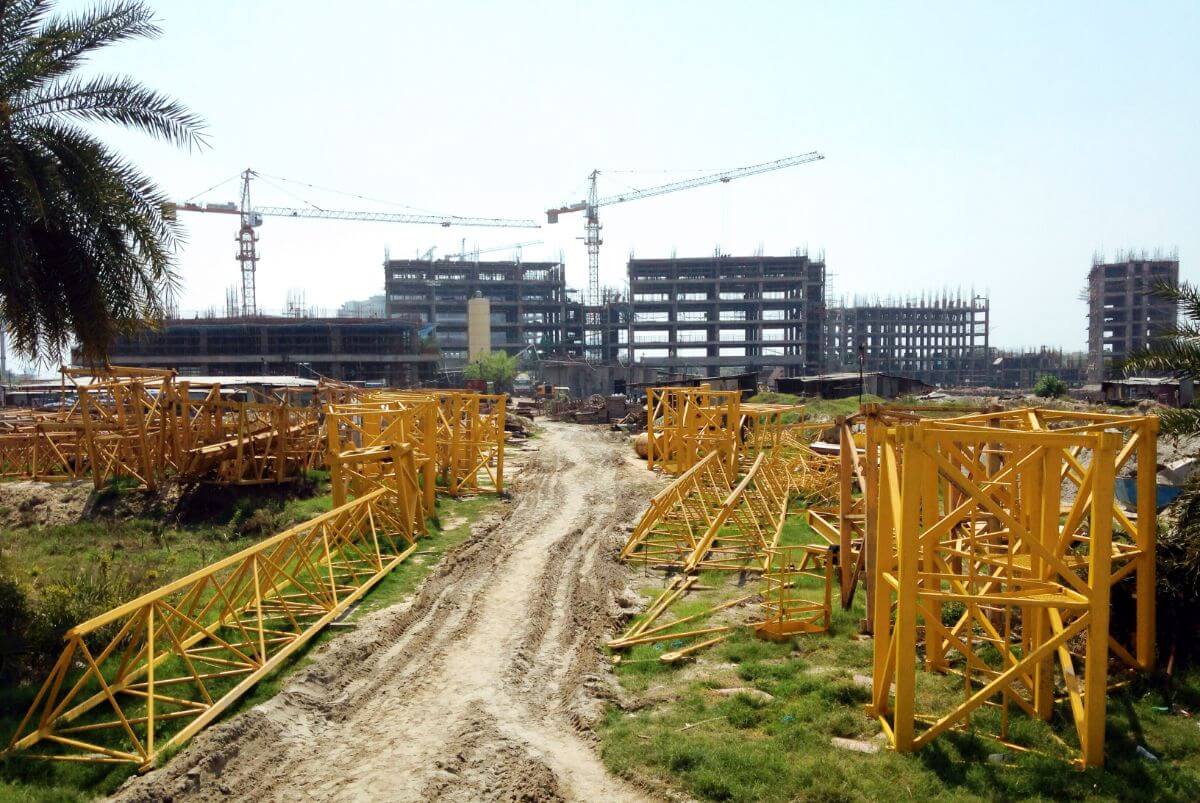
CSR Programs Making a Difference in the Construction Industry
AboitizEyesWhat are some CSR programs in construction companies?
- Green building certifications
- Ethical labor practices
- Conservation efforts
- Health and safety regulations
- Community engagement initiatives
Overview
- With the industry’s expansion, there’s a growing importance of Corporate Social Responsibility (CSR) in construction companies, considering their impact on the environment, local communities, and the workforce.
- CSR encompasses pursuing green building certifications, ensuring ethical labor practices, conservation efforts, health and safety regulations, and community engagement.
With a market size of $59.4 billion in 2022 and a predicted Average Annual Growth Rate (AAGR) of more than 7% from 2024 to 2027, the Philippine construction industry is positioned for spectacular growth. This upward trajectory is fueled by robust economic growth and substantial investments in key sectors like infrastructure and healthcare. The flourishing tourist and hospitality industry further propels the sector’s anticipated expansion.
With the construction industry poised for significant growth, Corporate Social Responsibility (CSR) is gaining prominence in the Philippines. This highlights the increasing importance of CSR programs in construction companies. Growing industries come with added responsibilities, and the construction sector is no different. The bigger the impact of projects on the environment, local communities, and the workforce, the more crucial it is for construction firms to enhance their focus on CSR reporting.
In this article, we will look at how firms respond to these challenges. Understanding the relationship between CSR and Philippine construction reveals the role steadfast business practices play in molding the nation’s future.
Green Building Certifications
In the construction industry, one of the most impactful CSR initiatives is the pursuit of green building certifications. Notably, certifications such as Leadership in Energy and Environmental Design (LEED) and Building Research Establishment Environmental Assessment Method (BREEAM) incentivize construction companies to craft buildings that prioritize energy efficiency, environmental friendliness, and resource conservation.
Companies obtaining these certifications demonstrate a dedicated effort to reduce their carbon footprint and actively contribute to fostering a more sustainable built environment.
Ethical Labor Practices

Laborers, professional tradesmen, and engineers may all be involved in construction projects. Central to the ethos of Corporate Social Responsibility (CSR) in construction is a resolute commitment to fostering ethical work practices.
This commitment manifests in endeavors to ensure fair compensation for all employees, providing safe and conducive working conditions, and offering avenues for continuous skill development. Beyond this, companies actively participate in initiatives that champion diversity and inclusion within their workforce, striving to create an industry that is not only ethical but also genuinely equitable and representative.
Conservation Efforts
Aboitiz Construction, Inc. is the construction branch of the Aboitiz Group of Companies. As a key member of this prestigious association, they push for sustainability and responsible business practices in the construction industry:
Safeguarding Resources
Aboitiz Construction is dedicated to a better future by driving the “Scrap to Crop and Waste Management” program in collaboration with the Lipa City Community Environment and Natural Resources Office (CENRO). This initiative allows local government authorities in Batangas City to improve waste management, including tree planting and composting.
Embracing Renewable Energy and Sustainability
The company co-sponsored the “Plastics 3R Hacks” hackathon to combat plastic pollution, and Aboitiz Construction wants to launch trash management initiatives and community gardens in Cebu. This program supplies fresh, chemical-free vegetables and promotes responsible environmental practices.
Health and Safety Regulations
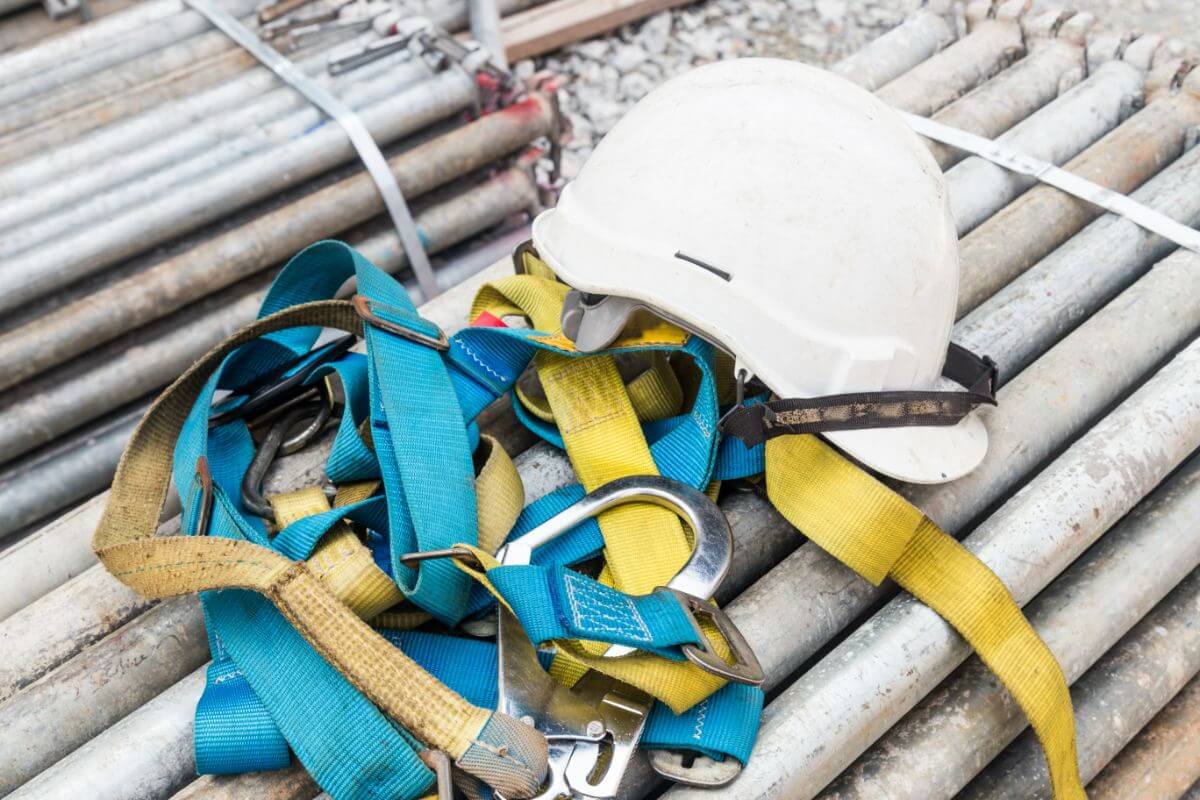
The health and safety of workers are a top priority for construction companies. CSR programs in construction companies place a high emphasis on adherence to health and safety laws.
In June 2023, Aboitiz Construction achieved a historic milestone by completing 10 million safe man-hours without lost time injury on its Taganito HPAL Nickel Corporation maintenance project in Claver, Surigao del Norte. Constant safety training, emergency response drills, and compliance with the Occupational Health and Safety Management System standard (45001:2018) demonstrate their commitment to safety.
This achievement demonstrates Aboitiz Construction’s dedication to operational excellence and worker safety. They employed roughly 1,000 locals over the last decade, focusing on preventive maintenance and guaranteeing efficient facility operations.
As the leader in corporate social responsibility, Aboitiz strives to be a great construction firm by putting safety first in all projects.
Community Engagement Initiatives
Construction projects can have an immense impact on the communities where they are built. Construction CSR programs frequently include strong community participation.
In collaboration with Pilmico Foods Corporation (PFC) and through Aboitiz Foundation, Inc.’s KINDer funding, the corporation gave to community pantries in Brgy. Batangas City, Pinamucan Ibaba, and Brgy. Olongapo City, Pag-Asa. These contributions were made to provide much-needed help to those afflicted by the 2019 pandemic, as well as to contribute to food security in these regions.
Key Takeaway
Corporate Social Responsibility became central in the construction industry in the Philippines, promoting sustainability and ethics. Aboitiz Construction Inc. embodies this commitment. Our dedication to resource protection, renewable energy, community resilience, and conservation sets the CSR benchmark, guiding the entire industry toward a more promising, more sustainable future.
Adopt CSR with us at Aboitiz. Let us collaborate to make the nation a better place by elevating communities, preserving nature, and creating a meaningful legacy. Contact us today.
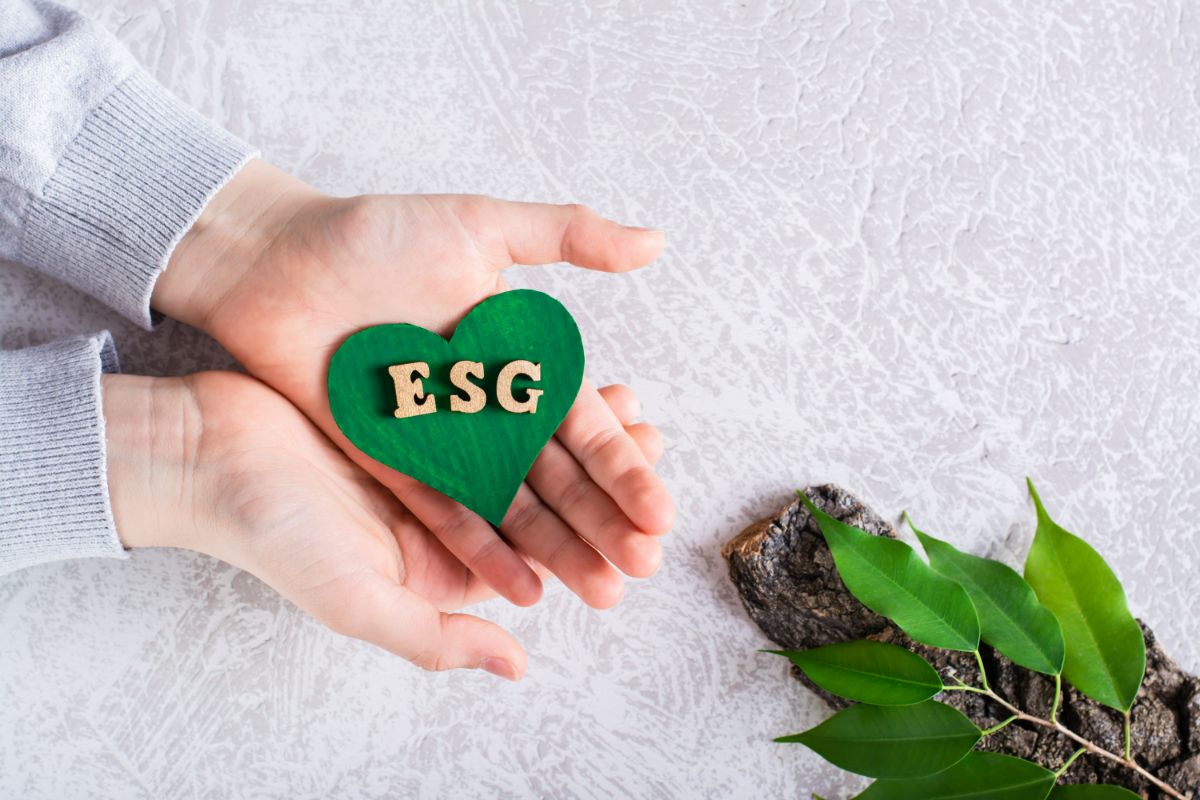
5 Ways ESG Reports Create Value For Businesses
AboitizEyesHow do ESG reports create value for businesses?
- They continue the global push toward a better future.
- They improve businesses’ transparency and information disclosure.
- They represent businesses’ move of giving back to the community.
- They boost customer trust and loyalty to the brand.
- They improve businesses’ long-term investment standing.
ESG reports are ways for businesses to disclose their performance across various Environmental, Social, and Governance issues. With the world turning an increasingly critical eye on the sustainability efforts of organizations, ESG reports allow companies to showcase what they have been doing and the progress they have made for the overall benefit of society at large.
There are a number of reasons ESG reports are necessary, beginning with the fact that they are mandated by a number of governing bodies. But there are also many ways that ESG reports create value.
Among others, here are some of the benefits ESG reports can provide for businesses:
They continue the global push toward a better future.
More than anything else, ESG reports are indicators of businesses’ moves toward worldwide development. With the rise of climate change, social inequality, and other major global issues, there is a monumental and ever-growing need for change in the world. Businesses represent a big part of this change because of their huge impact on the three ESG sectors, as well as the equally significant leaps they can take toward positive change.
ESG reports clearly state a business’ efforts toward goals, or lack thereof. They allow readers to hold the business accountable for its actions, inform stakeholders of the business projects, and push for environmental, social, and governance change.
They improve businesses’ transparency and information disclosure.
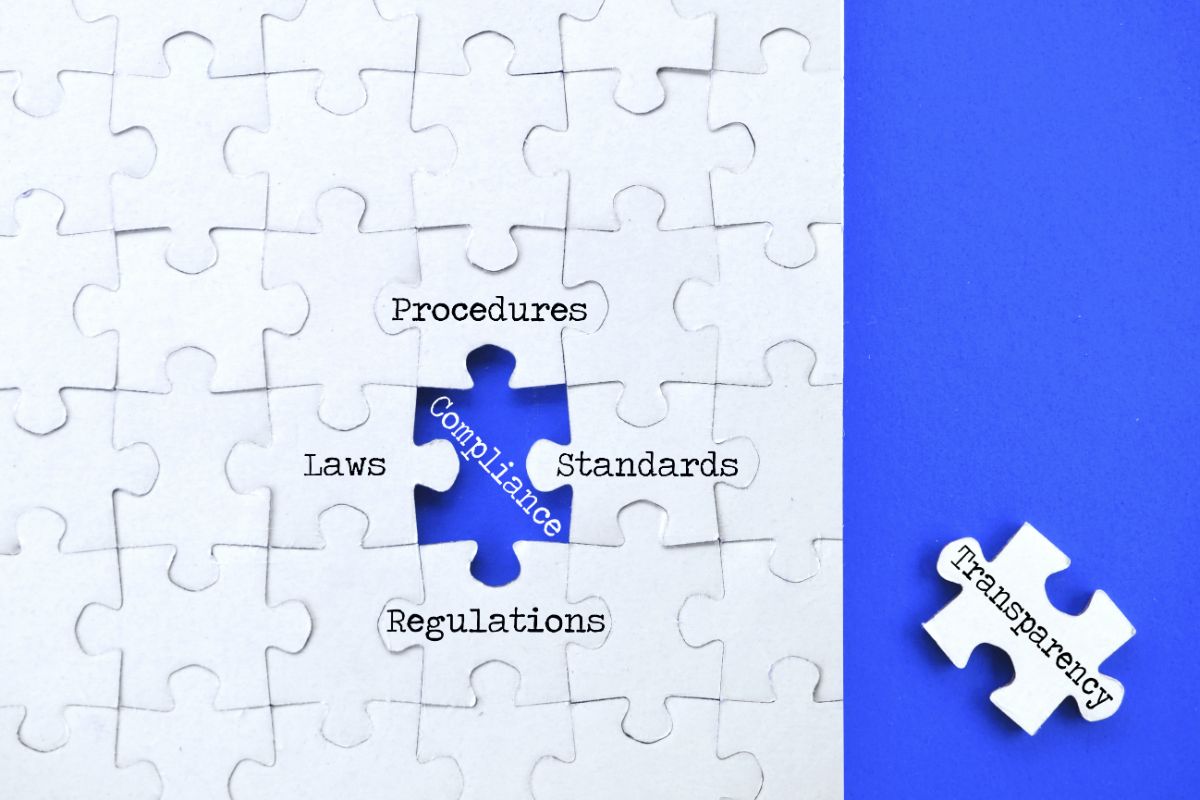
As we mentioned in the section above, ESG reports are made public to the business stakeholders. That includes investors, customers, employees, and supply chain partners. Transparency is good for building a business’s reputation as an honest, trustworthy entity. At the same time, it provides valuable information for governing bodies and global sustainability organizations to assess and foresee potential developments on a society-, nation- or worldwide scale.
They represent businesses’ move of giving back to the community.
Besides making the business’ ESG efforts visible to all, creating and publishing these reports creates a culture of caring for environmental and social welfare that can spread quickly throughout the company and beyond. It sets an example for employees, customers, and stakeholders to make conscious and actionable efforts rather than just saying so. Now more than ever, we need the change to be universal, so every action counts.
They boost customer trust and loyalty to the brand.

Because ESG reports are open to the public, businesses can make their efforts known to many, including their customers. This is good because customers nowadays pay attention to these kinds of efforts since they too see the need for them. Ethical practices, love for the environment and care for less fortunate communities all earn “plus points” in a customer’s eyes, and maintaining these efforts shows the customer that their patronage goes beyond purchasing a product or service.
Customers who see that the company they are patronizing is a leader in ESG might be more loyal because they feel that their patronage allows the company to do even better, or they may do it to show their appreciation for businesses that care for others. Sticking with the company becomes a win-win situation for all parties because the company profits while the patrons are comforted by the idea that they are contributing to or encouraging a better world.
They improve businesses’ long-term investment standing.
The effects of ESG efforts tend to show after some time, rather than immediately. This is something that investors know, and they look forward to being with the company when the effects happen. So an ESG report is perfect for showing past efforts that are taking effect in the current time as well as current efforts which will come to fruition in the future. Investors are more likely to choose businesses with strong ESG reports because of this.
Key Takeaway
There are a number of ways ESG reports create value, and we’ve outlined some of them in this article. We hope these benefits convince a greater number of businesses to make actionable efforts in the environmental, social, and governance spheres, not just for their own benefit, but for the world at large as well.
At Aboitiz, we make our efforts clear to all, as we acknowledge the work our forefathers have done and strive to follow in their footsteps. Our sustainability, community building, and governance programs and efforts are outlined in our ESG report. We encourage you to give it a look, and we look forward to a better world for us all.

ESG vs. CSR vs. Sustainability: What’s the Difference?
AboitizEyesWhat is the difference between ESG, CSR, and Sustainability?
- Sustainability is a strategy in which a business delivers its products and services in a way that is both ecologically and economically beneficial.
- Corporate Social Responsibility (CSR) is a business model that holds a company socially accountable to itself, its stakeholders, and the public.
- Environmental, Social, and Governance (ESG) is an approach to doing business that focuses on Environment, Social, and Governance factors.
Now that environmental stewardship and sustainability in the Philippines have become such increasingly important topics, you might hear the words “corporate sustainability,” “CSR,” and “ESG” in conversations more often. But what exactly do each of these terms mean, and how do they affect corporations all over the world?
It’s time to look into ESG vs CSR vs Sustainability and determine what exactly they are, who they affect, and what they can do for our planet.
Sustainability is a strategy in which a business delivers its products and services in a way that is both ecologically and economically beneficial.

Corporate sustainability can be defined as the overarching concept under which CSR and ESG both operate. If sustainability is the goal, the other two concepts in this article are the means to achieve and measure it.
Corporate sustainability refers to an organization’s responsibility to conduct its business without causing damage to the environment or to society. This used to be an additional benefit for consumers and investors alike, but today, it’s a necessity. As more and more consumers and investors are prioritizing businesses with sustainability efforts, it’s crucial for businesses of all shapes, sizes, and industries to consider sustainability efforts in the way they do business.
CSR is a business model that holds a company socially accountable to itself, its stakeholders, and the public.
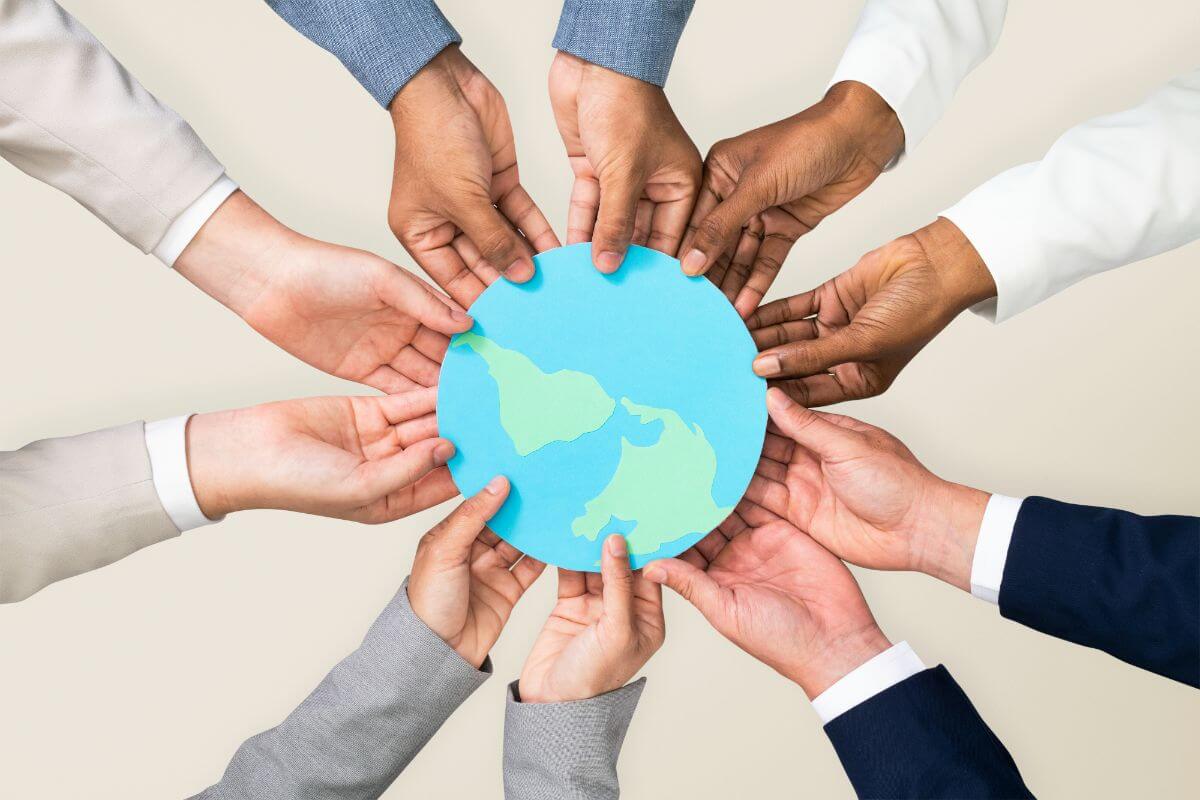
Corporate Social Responsibility (CSR), also known as corporate citizenship, enables and requires a company to be aware of and accountable for its impacts on society. These effects can be environmental, economic or social in nature.
In simple terms, CSR is a commitment the company makes to operate in a way that enhances rather than damages the planet and all who live in it. CSR programs are beneficial to the world and the people within the company itself, as it creates a more positive impact on society and raises the morale of its team members simultaneously.
CSR is often split into four categories: environmental impacts, ethical responsibility, philanthropic endeavors, and financial responsibilities.
Environmental impacts focus on lessening ecological damage; ethical responsibility encourages fair and positive treatment of people both within and outside of the company; philanthropic endeavors are those that contribute directly to society at large such as charities and advocacies; and financial responsibility ties together the previous three categories and details how the company’s finances go into each CSR project.
ESG is an approach to doing business that focuses on Environment, Social, and Governance factors.
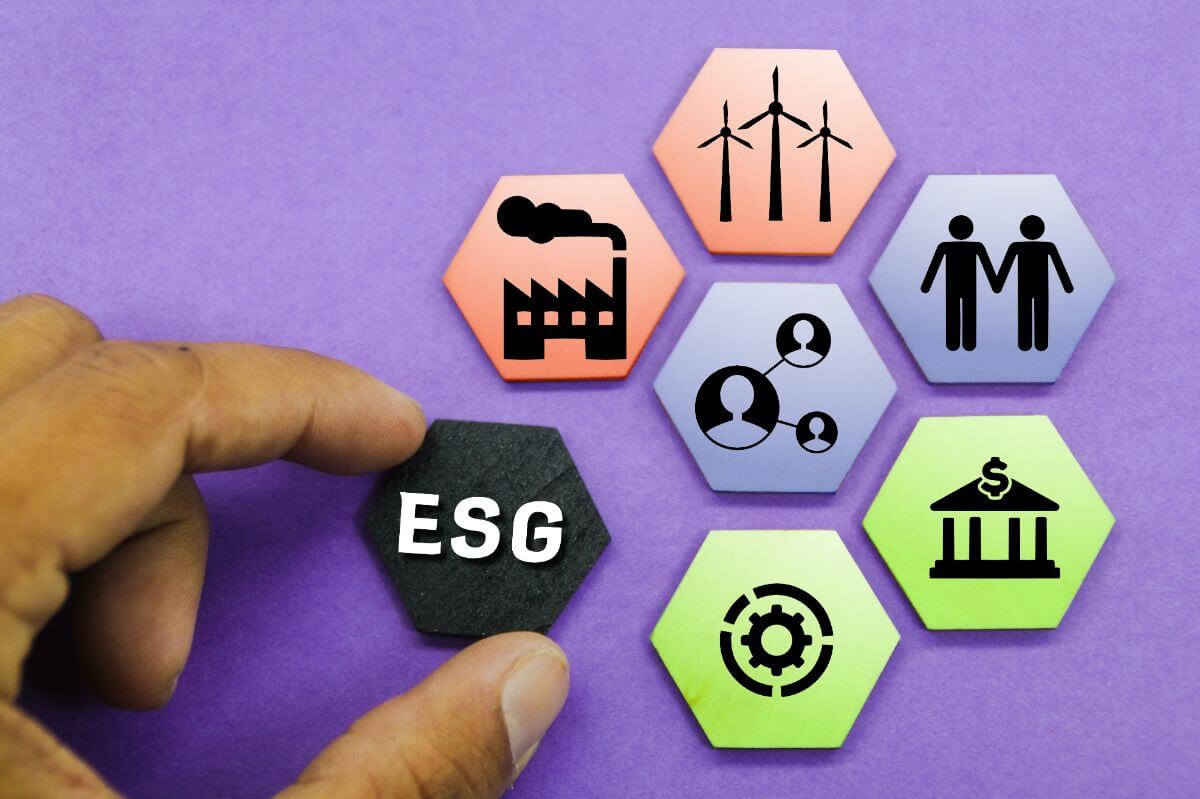
In contrast, Environment, Social, and Governance (ESG) factors are used to evaluate the impact of a company. Mostly used by those from the outside looking in, such as consumers and investors, ESG focuses less on what a business aims to do, but the actual effects and results of what it is already doing.
In simpler terms, if CSR focuses on the corporate social responsibilities and goals a business has, ESG measures whether or not it is actually achieving those goals. It provides quantitative measures that not only hold the company accountable but provide an actual report of how far the company has come in terms of sustainability.
ESG focuses on three specific areas: environmental factors like the business’ ecological footprint and advances made toward sustainable development; social efforts like community relations, customer satisfaction, and funding for projects that help underserved communities; and governance, which focuses on company policies itself and how it treats its own team members.
Key Takeaway
Now that we’ve discussed ESG vs CSR vs Sustainability, we hope you better understand the unique nuances each concept has and why each of them matter in running a business. As we said earlier in this article, Sustainability is no longer just a welcome addition—it’s a necessity in order for the business to keep going.
However, we believe in more than just sustainability for profit’s sake. We genuinely believe that the changes we make today can sustain a brighter tomorrow, and we are resilient in the face of challenges because we want a better world for future generations.
If you want to know more, feel free to take a look at our ESG efforts in the Philippines and sustainability reports. Check out the rest of our blogs here!

The Importance of Creating Sustainable Communities
AboitizEyesFor communities to survive and prosper, we need cities that are safe, affordable, and resilient to change. We need innovative, intelligent urban planning that sustains and allows current and future generations to thrive. Therefore, the way forward is to establish sustainable communities.
Even the United Nations has underscored the importance of these communities in their 17 Sustainable Development Goals to improve the quality of life for people and the planet. But why are sustainable communities so important?
With every generation, the world experiences continued overpopulation and rapid urban growth. In every country, more and more people migrate from provinces, shores, and farmlands to cities and metropolitans, giving us reason to believe that this trend will not stop in the decades to come. With these rapid changes comes the responsibility to accommodate citizens in sustainable cities.
Modern and technologically-adept cities are not enough. What else does it take for a community to be considered sustainable?
When we use the term “sustainable community,” we are referring to a population that can stay afloat or even thrive while relying solely on its human resources, natural resources, and financial capital. While this sounds fairly simple, there are quite a lot of factors that come into play when establishing a sustainable community.
A sustainable city or community is defined by improved living conditions.
A thriving community does not despair over housing and accommodations. People in this community do not need to wonder where they will sleep at night, or if they can have three meals a day. Because their needs are met, they can go beyond the physiological and structural needs of food, water, and shelter, and can instead think of improving themselves, their work, or their craft.
A sustainable city is resilient in the face of disasters.
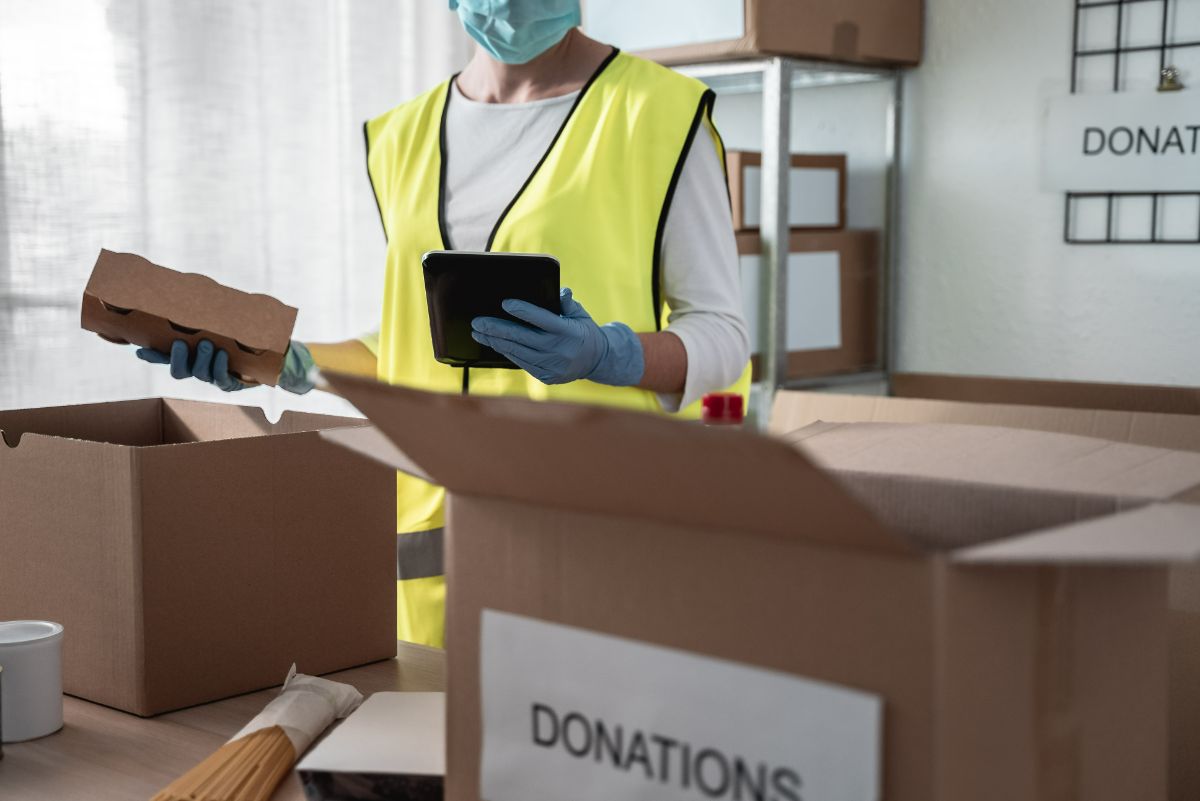
In addition to being structurally sound and financially capable of reacting to disastrous situations, a sustainable city has contingency plans in place for when the unplanned or unexpected occurs.
For example, in the event of a global pandemic, the city knows how to prioritize its healthcare system in a way that will not fatally compromise its economy. Should natural disasters like storms or earthquakes happen, the city is well-prepared and knows what to do to minimize the damage. Therefore, these and other disasters are not merely avoided but rather dealt with through safe, economical, and effective ways that prioritize the good of all.
A sustainable community is accepting of and inclusive of all cultures and diversities.
Sustainable communities are often melting pots of different cultures because people tend to flock to where they can thrive. The community leverages every person’s traditions and heritage to build a culture that is diverse, open, and always eager to embrace rather than discriminate.
This act of embracing diversity goes beyond simply accepting people of other cultures into the city’s territory; it also includes the protection of natural and cultural heritage, access to safe and inclusive green and public spaces, the inclusion and participation of natives in human settlement planning and management, and the support for positive economic, social, and environmental links among urban, peri-urban, and rural areas.
How can sustainable communities benefit the Philippines?
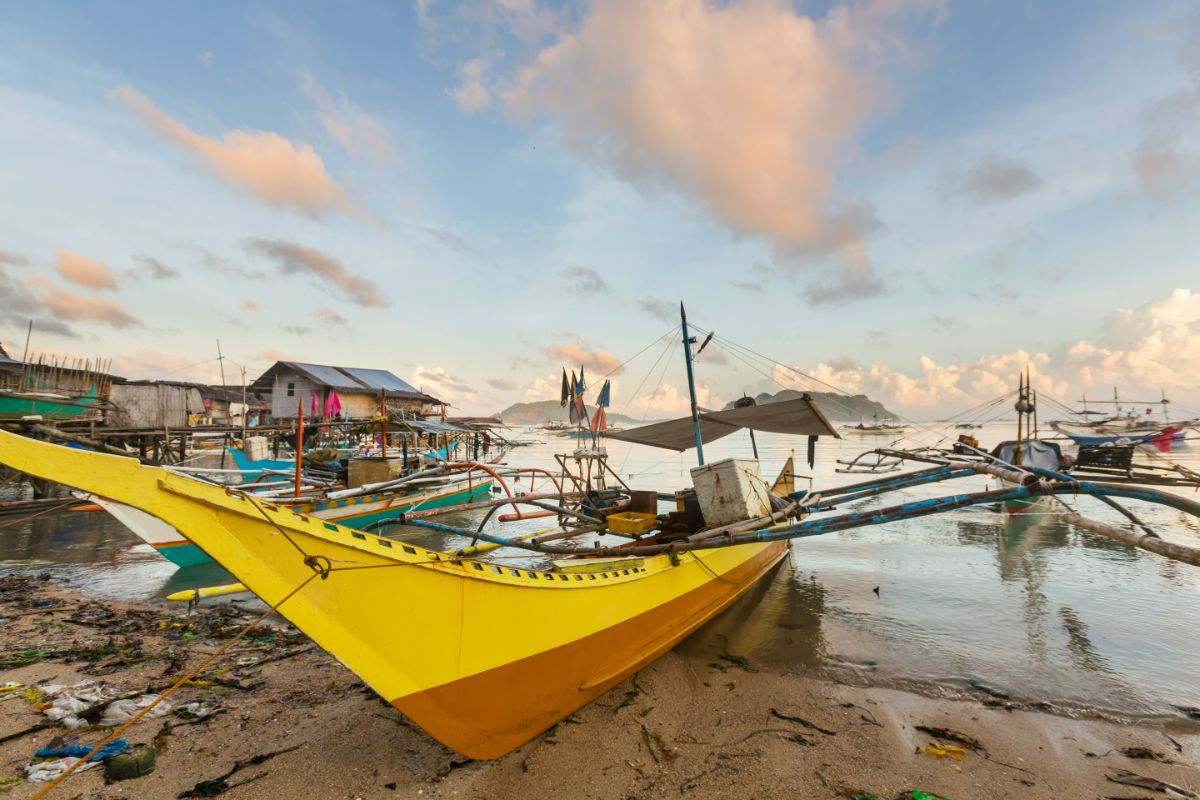
The Philippines has a population of about 102 million, and within this number, 27 million people live below the poverty line, marking both overpopulation and poverty as major issues in the Philippine landscape.
There is inequality in both urban and rural areas, characterized by discrimination against people of certain genders, educational attainments, and social classes. Many families do not have or own homes to live in, cannot eat three meals a day, and have no access to quality education.
Having sustainable communities in the Philippines would greatly reduce the issues we are currently facing today, from poverty to inequality to the lack of resources and nonfulfillment of needs.
What is Aboitiz doing to promote sustainable communities?
Over a century ago, the Aboitiz Group committed to fostering inclusive development and giving back to our host communities. Today, that legacy continues as we strive to develop sustainable communities through the Aboitiz Group and its life-essential business aims.
Aboitiz InfraCapital pursues infrastructure projects that are resilient and sustainable, besides being able to address the ever-evolving needs of Filipinos. AboitizLand develops residential spaces for culturally diverse and distinctive communities. AboitizPower generates energy that supports the economic development of cities and communities. Among other pursuits, these three branches of the Aboitiz Group are spearheading our move toward establishing sustainable communities in the Philippines.
You can read more about our sustainable community efforts in our annual reports.
Key Takeaway
The growth of urbanized communities calls us to optimize populations for sustainability. In this article, we discussed what makes a community sustainable, why these communities are important, and how the Aboitiz Foundation contributes to this shared humanitarian goal.
As pioneers and players in the field of sustainability, we encourage everyone to take up the mantle of being a steward for sustainable development. Whatever your role in society may be, we believe that you are crucial in ensuring a better and brighter future for all—be it your community, the Philippines, or the world.

A Guide to Sustainability Partnerships
AboitizEyesSustainable partnerships are an essential concept to both businesses and society. The advantage of multi-stakeholder projects is that businesses can deliver remarkable results towards risk areas that are aligned to the United Nations Sustainable Development Goals (SDGs).
By working together with like-minded organizations, there is better synergy in addressing today’s challenges.
We believe it is non-viable to have a strong, functioning business in a world of increasing inequality, poverty, and climate change, so we take action. We at the Aboitiz Group understand that they are the cornerstones to achieving continuous, inclusive growth.
What Sustainable Partnerships Are, and Why We Do It

Partnerships for sustainability are essentially what they’re named: two or more businesses teaming up to contribute to sustainability goals.
Based on the sort of impact they’d like to make on the environment or their communities — or both — businesses may find themselves seeking out others who have the same agenda. This is where a sustainable partnership is born.
Why? True sustainability means taking collective action. It’s not something you can do alone. After all, all aspects of society are deeply entwined, making such issues systemic.
As a result, taking individual, non-cohesive steps will yield only limited impact. Many organizations may also not have the right resources, knowledge, skill, or scale to tackle issues on their own.
Strong partnerships provide a great way to promote sustainability, pursue inclusive business enterprises, and ultimately transform both businesses and communities for the better.
How We Do Sustainable Partnerships

Sustainability partnerships spark change towards responsible, inclusive and sustainable growth. However, they are, at times, challenging to establish, and even harder to maintain.
So, how do we do it?
The answer is establishing strategic alliances. Aboitiz Group is part of both local and global movements who seek to build an economic system that not only generates value, but also addresses the needs of the people and the planet.
Through that, we combine our efforts, and proactively address and solve the challenges our communities face. Here’s a closer look at some of the partnerships we’ve built over the years:
United Nations Global Compact Network Philippines (UN GCNP)
We are committed to supporting the global campaign to end poverty and do so by distributing a portion of our financial gains to key stakeholders. This is possible through the several programs that directly serve our benefactors, through generating new job opportunities, increasing domestic products, and empowering local and indigenous communities with the tools and education they need to become efficient in their field of work — ultimately helping to alleviate poverty through inclusive programs and social investments.
Pilipinas Kontra Gutom (PKG)
A collective effort among local government units (LGUs), non-government organizations (NGOs), and companies like ours, we contribute to PKG’s goal of improving food production and distribution to ultimately reduce instances of food insecurity in the country.
Through our food arm Pilmico, we also seek partnerships with communities to promote sustainable agriculture practices and empower local food producers. Additionally, we host community feeding programs that aim to decrease malnutrition in students, whileproviding economic support to food vendors, such as bakeries. These are carried out in collaboration with LGUs.
Quality Education
We have dedicated ourselves for over 15 years to supporting local educational institutions, and young scholars.
One such example of our dedication to providing quality education while championing innovation is the establishment of the Aboitiz School of Innovation, Technology, and Entrepreneurship (ASITE), in partnership with the Asian Institute of Management (AIM). Through ASITE, we aid the development of new talent and upskilling for data science and innovation in the country.
Philippine Business Coalition for Women Empowerment (PBCWE)
Working with PBCWE, we hope to improve gender equality in our workplace, making sure everyone feels safe and heard in their teams. We also use this partnership to learn and adopt the best practices for our culture, processes, and policies.
We promote inclusivity and equality for the LGBTQ community, through our Pride Forums. This serves as a venue for participants to learn more about both the concepts and the laws that pertain to sexual orientation, expression, and identity. This, in turn, promotes both awareness and sensitivity to the issues that affect this community.
Partnerships for Digital Innovation
Aboitiz Group leads in the digital and sustainable transformation, including banking and financial services. Through partnerships and digital innovations, we provide efficient services and connect remote communities to essential financial services. For instance, our AI and Innovation Center collaborated with UnionBank’s Customer Engagement Group, utilizing the NPS Freetext Analysis Tool. This automated tool analyzes feedback from online surveys, social media, and interviews, enabling UnionBank to create personalized offers and enhance customer experience. Streamlining analysis of thousands of responses and inquiries, this partnership drives improved services.
Philippine Business for Social Progress (PBSP)
We perform extraordinary diligence in evaluating all our prospective land developments — this helps us design and build communities that are sensitive to their surrounding environment and ecosystem.
One such project of ours includes the Seafront Residence, which works in partnership with the University of the Philippines to promote pawikan preservation efforts. Furthermore, we have master planned all our communities to provide easy access to transportation, electricity, and other necessities, providing a more holistic lifestyle to the Filipino Family.
Task Force on Climate-Related Financial Disclosures (TCFD)
Aboitiz Group, through our Aboitiz Equity Ventures arm, was the first Philippine company to sign on and support the international Task Force on Climate-Related Financial Disclosures (TCFD). We work with more than 930 international organizations and commit to developing climate-related financial risk disclosures.
Local Fisheries for Life Below Water
We work in partnership with local fishers and fisheries to promote the practice of sustainable fishing and marine protection. We also create sanctuaries for marine life, such as our Therma South facilities with their enclosures to protect pawikans and their nests.
APEC Business Advisory Council (ABAC)
We understand that truly impactful work stems from a collaborative effort, so we look for new ways to increase both local and international cooperation as we do our part toward driving global sustainability.
For more than two years now. Aboitiz President and CEO Sabin Aboitiz has been appointed to the Asia Pacific Economic Cooperation (APEC) Business Advisory Council, which is tasked to provide Asia-Pacific economies with the business perspective on various areas of cooperation. In December 2022, he was announced as the 2023 ABAC Sustainable Growth Working Group Vice-Chair. The working group will lead initiatives in promoting an effective response to climate change and transition to a low-carbon economy, as well as supporting efficient and sustainable processes across the food value chain of the region.
Key Takeaway
Through these sustainability partnerships, we create shared value among our stakeholders in contributing to the achievement of the UN SDGs.
Our efforts towards addressing these pressing challenges and the results of these efforts are all collated and available for public consumption. Read our recent Annual and Sustainability report here. Our CSR efforts through Aboitiz Foundation — which are also closely tied to SDGs — can also be viewed here.
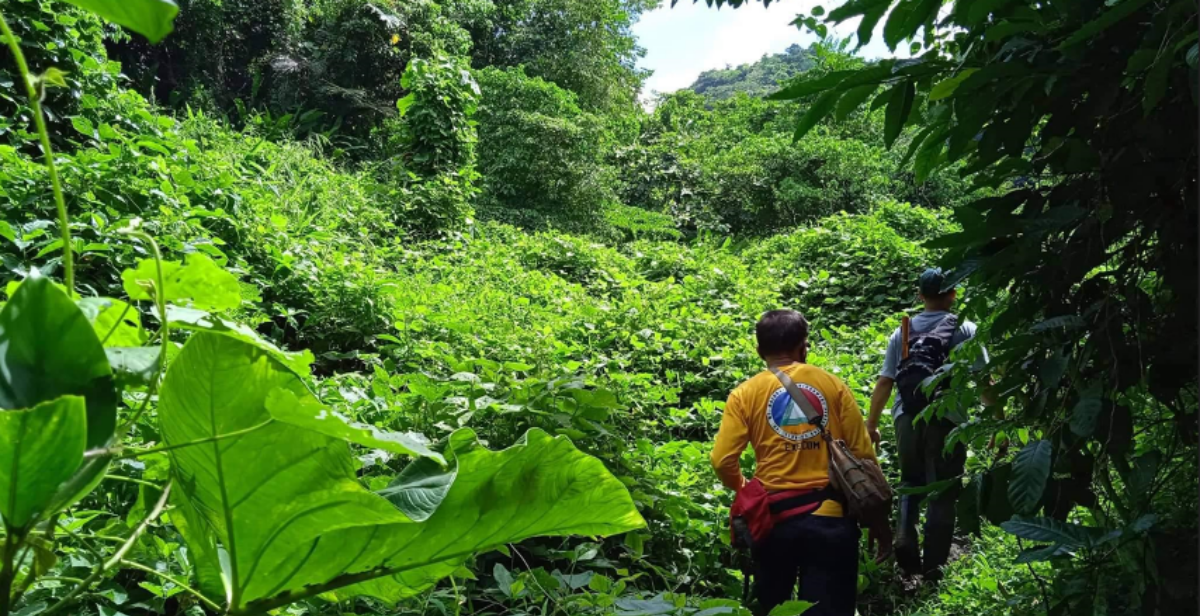
ABOITIZ CONSTRUCTION ADOPTS 1.6 HECTARES OF NAPOCOR’S TREE PLANTING SITE
AboitizEyesAboitiz Construction has partnered with the National Power Corporation (NAPOCOR) to advance its environmental sustainability initiatives. The collaboration involves the adoption of a 1.6-hectare tree planting site in the Makiling-Banahaw Geothermal reservation area. Over the course of three years, Aboitiz Construction will actively participate in NAPOCOR’s Energy Sector Carbon Sequestration Initiative, aiming to mitigate climate change by rehabilitating priority areas for restoration.
To spearhead the reforestation activities in the designated area, Aboitiz Construction has extended financial support to the Mt. Malaraya Environmental Protection Council, Inc. (MMEPCI). This people’s organization, based in Southern Luzon, will play a vital role in maintaining and carrying out plantation duties at the site. The program not only focuses on environmental conservation but also seeks to create livelihood opportunities for community members associated with MMEPCI.
Read more about it here: https://aboitiz.com/aboitiz-construction-adopts-1-6-hectares-of-napocors-tree-planting-site/
